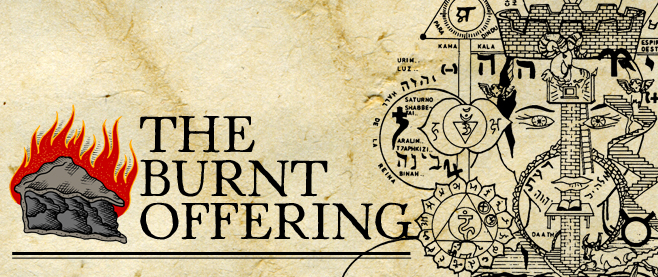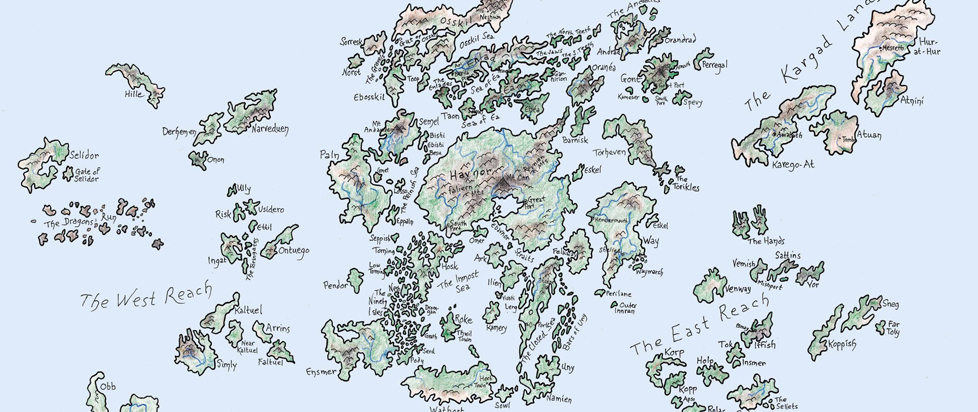
The Rivers, The Sea
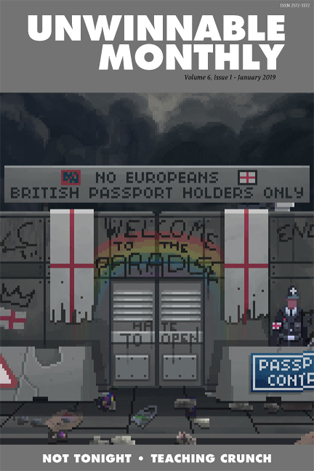
This column is a reprint from Unwinnable Monthly #111. If you like what you see, grab the magazine for less than ten dollars, or subscribe and get all future magazines for half price.
———
The Burnt Offering is where Stu Horvath thinks too much in public so he can live a quieter life in private.
———
A confluence:
1.
I’ve been fascinated by storytelling roleplaying games – that is, narrative focused RPGs, often with novel mechanics that fly in the face of, or otherwise deconstruct, the complex, simulation-based rules of traditional tabletop RPGs – for several years. Over the course of 2018, I have bought and read a number of story games and, despite them often taking an approach to roleplaying that deeply appeals to me, the prospect of actually sitting down to run them kind of terrifies me. The trite metaphor of performing on the trapeze without a net neatly sums up that anxiety.
2.
Tales From the Loop is a storytelling game in a traditional RPG wrapper. The rules are light and play is very improvisational, but there is just enough structure to prevent me from falling to pieces when running it. I ran two fairly successful sessions of the game. I used a published scenario, but heavily modified with an eye towards running an ongoing campaign set in my hometown. Every time I sit down to write a new session, I draw a devastating, paralyzing blank.
3.
Last month, I wrote a column that involved fantasy words, how to pronounce them and why worrying about it is silly. I just re-read it in preparation for reprinting it on the site and it is fine, but I feel like the point of the essay isn’t the one I had set out to make.
4.
I am currently reading Ursula K. Le Guin’s A Wizard of Earthsea for the first time and I am struck by how focused it is on language. In Earthsea, language and names are literally the foundation of magic. Using language to communicate, we describe the world. In Le Guin’s world, the right kind of words, said in the correct way, can change it. The way this correlates to the act of writing is clear.
5.
I have finally carved out a little time to work on a new D&D zine. The idea, begun with Hags of Black Woods, is to take my decades worth of campaign notes and refashion them into something other dungeon masters might be able to use. This time around, I’m working with a certain island I am fond of that, despite my fondness, needs quite a bit of effort to be presented for general use. I’ve had to make up quite a bit of new material to support it and I have been surprised at how effortless that creative work has been.
* * *
The ocean:
A roleplaying game’s system is a collection of rules that develops and maintains a system of storytelling among a group of people.
A language is a collection of rules that develops and maintains a system of communication among a group of people.
Whether a strict simulation or a freeform narrative, roleplaying rules form a framework for communication among a collective of players. Rules are designed to shape the flow of play, define how the world works – what can and can’t be done – and maintain a consistency of experience among all involved. Further, the rules are enforced through consensus: if a rule doesn’t mesh with the group’s vibe, it can be revised. Every group’s house rules form a unique dialect of the mother tongue.
Le Guin outlines her game-like language of magic, and magic of language, in A Wizard of Earthsea, where the power of names fuels sorcery:
“The sea’s name is inien, well and good. Bet what we call the Inmost Sea has its own name in the Old Speech. Since no thing can have two true names, inien can mean only, ‘all the sea except the Inmost Sea.’ And of course it does not mean even that, for there are seas and bays and straits beyond counting that bear names of their own. So if some Mage-Seamaster were mad enough to try to lay of spell of storm or calm over all the ocean, his spell must say not only inien, but the name of every stretch and bit and part of the sea through the Archipelago and all the Outer Reaches and beyond to where names cease. Thus, that which gives us the power to work magic, sets the limits of that power . . .”
If roleplaying games are language, D&D is my native tongue. I have been speaking Dungeons & Dragons since the fourth grade. My group of players, the core of which formed when we were in seventh grade, has played D&D together more than any other game. While there are varying levels of command within the current group, we all have a baseline of fluency. As Dungeons & Dragons has, since 1974, been the most widespread and commercially successful RPG on the market, I suspect this is true of a great many groups of tabletop gamers, making it the lingua franca of the hobby.
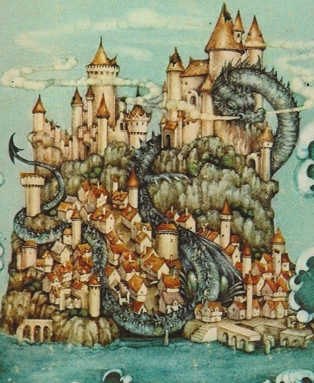
Through four years of high school, I took Latin, which is enough to give me a fuzzy understanding of pronunciation, declensions and a very modest vocabulary. It never struck me as particularly useful until a few years back, when I spent a few vacations in Montreal and discovered it gave me an equally fuzzy understanding of French (which, as a Romance language, has its roots in Latin). Not enough to actually communicate, but enough to not be completely baffled by the conversations going on around me.
D&D provides a similar base fluency for games derived from it. In this way, I can jump into pretty much any RPG released by TSR and make it up as I go. Despite some notable differences in execution and sensibility, I can also move to Chaosium’s Call of Cthulhu with relative ease. In turn, West End’s Star Wars shares a fair amount of DNA with the design philosophies behind Call of Cthulhu, so I can hop into a TIE fighter with only a bit more adjustment. There is still a learning curve between each transition, but you pick up the gist fast.
These are all games with an eye towards simulation. Storytelling games, which started to surface in 1989 with the Prince Valiant RPG and have come into their own in the new millennium, seek to jettison the notion of using math and charts to build an emulation of reality in favor of focusing on language, character development and dramatic flair, all loosely constrained by guidelines and the occasional odd mechanic for conflict resolution (why use dice, when you can use dominoes, or apply the bet-raise-see system of poker to narrative?).
In terms of language, the difference between simulation and storytelling games is similar to the differences between writings systems. Braille and standard written English are accomplishing the same thing – communication of language – but the method of transmission is vastly different. A reader of English can’t pick up a book written in Braille and just wing it, even if the Braille is conveying English words. An amount of training and learning is required.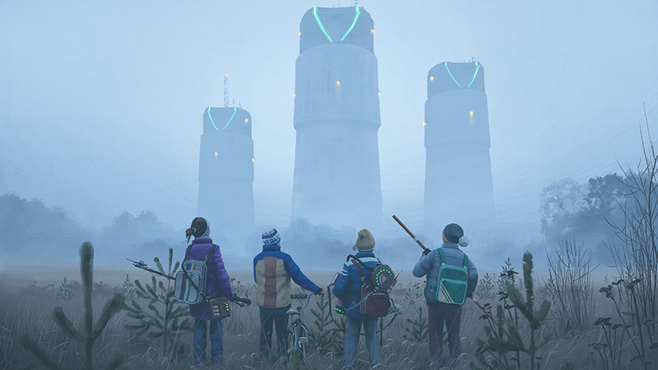
When approaching a roleplaying game to run, my brain is rigidly adapted to Dungeons & Dragons. I think in it and bend the new game to fit my existing ideas of how the language is supposed to work. For many games, this approach provides a good starting point, but it fails entirely when dealing with something so different as a storytelling game. This is why I can effortlessly fill in the gaps in my forthcoming D&D zine while struggling to even come up with an idea for a Tales From the Loop scenario. There is decades of mental scaffolding supporting D&D in my brain. Tales From the Loop not only lacks scaffolding, it has to find a way to navigate through the vast territory already claimed by a game far older and far more played. I have learning to do.
Le Guin again: “Thus, that which gives us the power to work magic, sets the limits of that power. A mage can only control what is near him, what he can name exactly and wholly. And this is well. If it were not so, the wickedness of the powerful or the folly of the wise would long ago have sought to change what cannot be changed, and Equilibrium would fail. The unbalanced sea would overwhelm the islands . . . and in the old silence all voices and names would be lost.”
———
Stu Horvath is the editor in chief of Unwinnable. He reads a lot and curates Vintage RPG on Instagram. Follow him on Twitter @StuHorvath.



